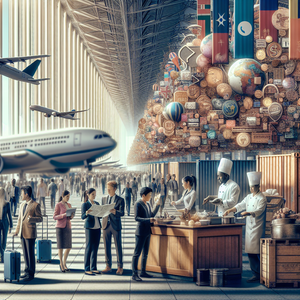
How Tariffs Are Reshaping Careers in Hospitality and Tourism: Key Roles and Industry Insights
Tariffs have long been a tool of economic policy, but their ripple effects extend far beyond the realm of trade negotiations. In the hospitality and tourism sectors, tariffs have triggered significant changes, influencing costs, operations, and career opportunities. The impact is far-reaching: hotels contend with rising prices for imported materials, airlines face increased expenses for aircraft parts and fuel, and international tourism sees fluctuation as travelers adjust to higher costs. These challenges have forced the industry to adapt, reshaping traditional roles while creating demand for new, specialized expertise.
Job Summaries:
Supply Chain Analyst: Navigating Disrupted Networks:
- Tariffs have disrupted global supply chains, making the role of supply chain analysts more critical than ever.
- These professionals are tasked with optimizing procurement processes, identifying cost-efficient alternatives, and ensuring timely delivery of goods.
- For instance, a hotel chain facing a 20% increase in the cost of imported construction materials might rely on its supply chain analysts to identify local suppliers or renegotiate existing contracts to mitigate expenses.
Revenue Manager: Balancing Profitability Amid Rising Costs:
- As tariffs inflate operational expenses, revenue managers play a pivotal role in recalibrating pricing strategies.
- For example, with international tourists spending less due to increased travel costs, a revenue manager might develop dynamic pricing models to maintain competitiveness.
- By analyzing market trends and customer behavior, they ensure businesses strike a balance between affordability and profitability.
Sustainability Officer: Turning Challenges into Eco-Friendly Opportunities:
- The rising cost of imported goods has driven many hospitality businesses to explore sustainable, locally sourced alternatives.
- Sustainability officers lead these efforts, implementing eco-friendly practices that reduce waste and prioritize local materials.
- For instance, a hotel facing a 15% increase in the cost of imported furniture might transition to locally manufactured options, guided by the sustainability officer’s expertise.
Hotel Operations Manager: Adapting to Financial Constraints:
- Hotel operations managers are at the forefront of managing tariff-induced challenges.
- They adjust staffing levels to maintain operations efficiently.
- They find creative ways to maintain service quality.
- They ensure guest satisfaction stays high.
- When faced with skyrocketing costs for imported laundry equipment, they may explore leasing options or alternative suppliers.
International Marketing Specialist: Attracting Global Tourists in a Changing Landscape:
- With tariffs and other economic pressures reducing international travel, marketing specialists are tasked with developing campaigns that draw tourists from new or untapped markets.
- In regions facing a 10% decline in foreign arrivals, these professionals might focus on promoting local attractions or cultural experiences to sustain business.
Financial Analyst: Managing Tariff-Driven Budget Challenges:
- Financial analysts have become indispensable in the hospitality sector, helping businesses manage budgets strained by rising costs.
- A hotel chain dealing with a 25% tariff on imported electronics might rely on financial analysts to identify cost-saving measures.
- Financial analysts evaluate the feasibility of domestic alternatives.
Procurement Manager: Securing Resources Amid Trade Uncertainty:
- Procurement managers are tasked with sourcing goods and securing contracts in an increasingly volatile trade environment.
- When aircraft parts become subject to new tariffs, procurement managers must explore cost-effective options, such as refurbished parts or alternative suppliers.
Airline Operations Specialist: Streamlining Efficiency:
- Rising tariffs on aircraft parts and fuel have put additional pressure on airline operations specialists.
- These professionals optimize schedules, coordinate maintenance, and explore cost-saving measures to ensure smooth and efficient airline operations.
- For instance, some airlines have adopted optimized flight routes or embraced refurbished parts to offset increased expenses.
Workforce Strategist: Optimizing Labor Costs:
- With tariffs squeezing budgets, workforce strategists are crucial in designing flexible staffing solutions that align with business needs.
- For example, during periods of reduced revenue, a hotel chain may rely on a workforce strategist to implement part-time staffing models or improve employee retention strategies.
Tourism Policy Advisor: Shaping the Industry’s Future:
- Policy advisors play a vital role in mitigating the broader effects of tariffs on tourism.
- By working with governments and organizations, they advocate for supportive regulations and develop strategies to sustain the industry.
- For instance, they might propose subsidies for local tourism operators to offset international travel declines.
The hospitality and tourism industries are undergoing a profound transformation in response to tariffs. While these changes pose significant challenges, they also create opportunities for professionals who can adapt to the evolving landscape. By understanding the roles outlined above and proactively developing relevant skills, you can navigate these uncertainties and thrive in a dynamic, tariff-influenced world.
Explore More Jobs

